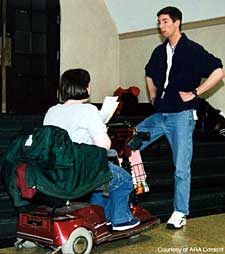|
Cindy Wetherby
 Proving
That Disability Education Becoming Part of Daily Life Proving
That Disability Education Becoming Part of Daily Life
 (ARA) - Cindy Wetherby buzzes around the campus of Northwestern
College in Saint Paul, Minn., on a motorized cart equipped with
oxygen. A lung dysfunction that left Wetherby with 27 percent less
lung volume than the average person hasn't prevented her from pursuing
a college education and teaching career.
(ARA) - Cindy Wetherby buzzes around the campus of Northwestern
College in Saint Paul, Minn., on a motorized cart equipped with
oxygen. A lung dysfunction that left Wetherby with 27 percent less
lung volume than the average person hasn't prevented her from pursuing
a college education and teaching career.
Wetherby is among 43
million Americans with disabilities, according to the Americans
with Disabilities Act (ADA), and their presence in every day life
is becoming common, accepted and even welcomed. In the last decade,
Americans have broadened their horizons regarding the disabled thanks
to the 1990 passage of the ADA, disability awareness education and
increased inclusion of the disabled in schools and businesses.
"Christopher Reeve has
been a great example of what a disabled person can do," Wetherby
says. Paralyzed from the neck down in a horse show-jumping accident
in 1995, "Superman" Reeve has become an international crusader for
spinal cord injury awareness and research. He's also returned to
film both as an actor and director, and has become a sought-after
speaker.
Wetherby is another
example, and she's thrilled to enlighten her own little corner of
the world. "I'm an education to those around me," she says. From
Northwestern, to her children's schools to her church and neighborhood,
Wetherby says, "People are curious when they see me and I want them
to approach me. This way they learn about my disability and about
me as a person."
She says her outgoing
personality helps create an atmosphere of comfort and ease. "I use
humor. I'm always laughing and like to see people laugh. Humor breaks
down some of the barriers and makes me approachable. I also watch
body language, which helps me gauge how to deal with people."
In the 13 years Wetherby
has been living with her disability, she's gleaned insights into
how to approach and get to know a disabled person. "Be open; don't
be afraid to ask questions. Take the time to talk and be sure to
listen. Don't be reluctant to ask how to help in case they ever
need assistance or emergency help. And please, don't assume or be
judgmental about a person or their disability. For example, some
assume I was a smoker, but I wasn't. I'm on oxygen because of a
lung dysfunction."
Since coming to Northwestern,
Wetherby has discovered that her presence in classes, the library
and cafeteria educates her fellow students as well as faculty and
staff. "I believe God put me here so people could see me, meet me
and be aware of those of us with disabilities," she explains. "I'm
here to let students know it's okay to get to know me. I'm comfortable
with this; they can be, too. A lot of students have never been exposed
to a person with a disability, so it's good that I'm here."
Wetherby has learned
a lot in the process as well. When she began student teaching at
a local middle school, she was a bit uncomfortable dealing with
all her equipment and students' reactions. "My supervisor told me
to be straight with the kids and explain what happened," she recalls.
"They are naturally curious and need to know. After that, we were
all just fine."
Wetherby and other disabled
students at Northwestern have an advocate in the Disability Office
of Support Services (DOSS). Like similar programs in colleges across
the country, DOSS offers peer helpers and tutoring, alternative
testing conditions, accessibility support, study skills and strategies,
room accommodations and parent advocacy among many other services.
Dr. Yvonne Redmond-Brown,
DOSS director, says the department's services are for the entire
college, not just disabled students. "We encourage fellowship and
connectedness of the disabled within the entire campus. We are here
to help everyone learn about the everyday struggles and limitations
so we all can understand and support each other."
One vehicle Dr. Redmond-Brown
has implemented is DOSS Awareness Week held each fall on Northwestern's
campus. The week provides opportunities for students, faculty and
staff to focus on learning styles and challenges, college transitions
and resources. Events include panel discussions, workshops, class
sessions and lunchtime chats with guests who have met life's challenges
through their disabilities. "It's an opportunity to grow through
fellowship," Redmond-Brown says.
Wetherby admits she's
had some personal challenges on campus, from sitting idle during
lunch while her cart's battery recharges to calling her teenager
to bring a replacement oxygen tank to campus. "We all have disabilities,
some are visible and some are invisible," she says. "But disabilities
are only as challenging as our minds let them be."
Courtesy of ARA Content
|


 Proving
That Disability Education Becoming Part of Daily Life
Proving
That Disability Education Becoming Part of Daily Life